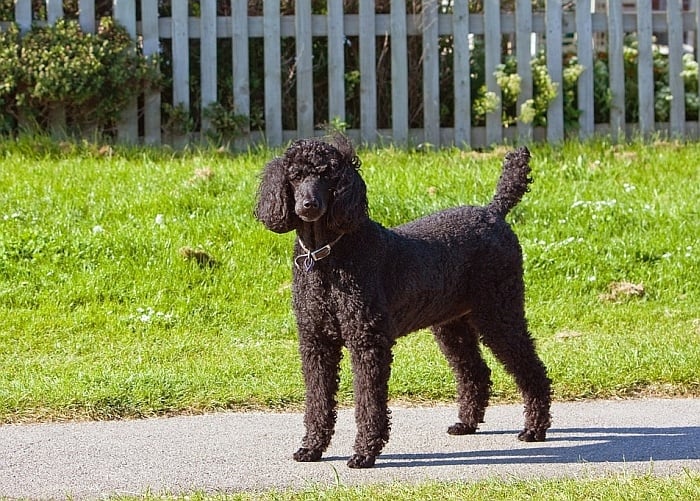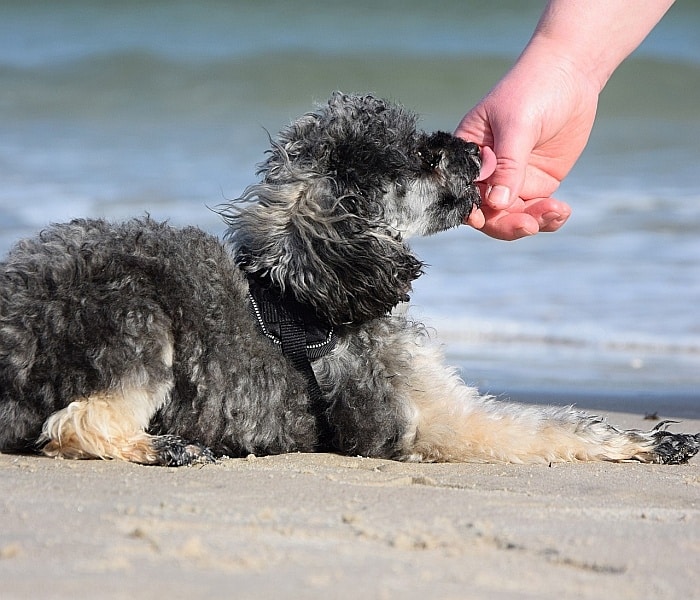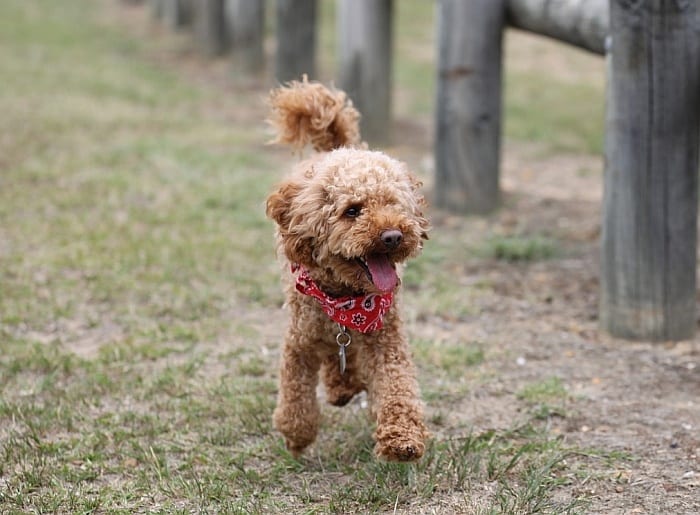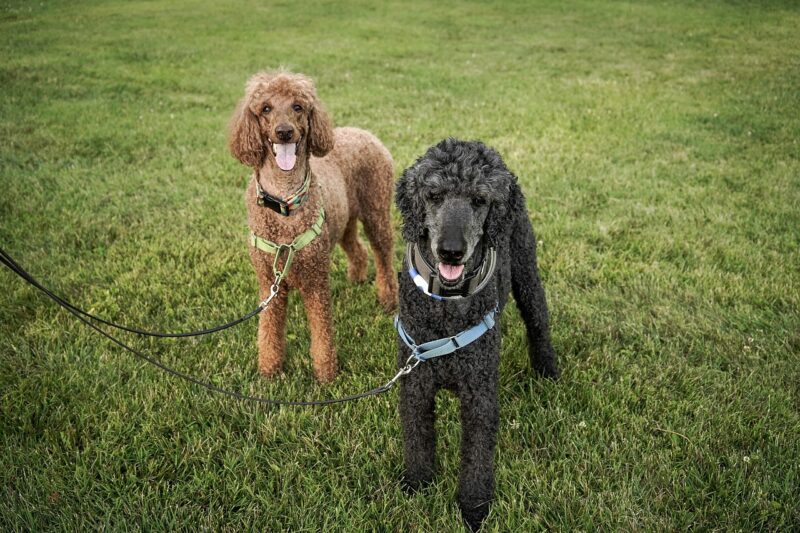Haha Look at This Funny Doggo Frisbee Doggo
Poodles are one of the most popular dogs in the US (The American Kennel Club lists them as the 7th most popular breed), and it is easy to see why: They are intelligent, affectionate, and enthusiastic pups, clad in an iconic curly coat. They typically become beloved family members in short order and they can live very long lives.
But not all poodles are created equally, and poodles come in a few different forms. The AKC recognizes three different types, but other registration agencies and poodle enthusiasts recognize two additional variations.
We'll discuss each of these types, including a bit about their size and other interesting characteristics below.
The Five Basic Types of Poodle
The three AKC-recognized poodle types are listed first, while the last two are only recognized by poodle aficionados and a few other breed registries.
Note that the AKC regards all the three recognized variations (standard poodle, minature poodle, and toy poodle) as size variants of the same breed. By contrast, the UKC considers standard poodles a different breed than miniature and toy poodles.
1. Standard Poodle

The standard poodle is the largest form of the breed, and they stand at least 15 inches at the shoulder (most are between 20 and 23 inches tall) and weigh between about 45 and 80 pounds.
Although they are not that visually intimidating, standard poodles actually make pretty good guard dogs, as they are alert, brave, and protective of their owners.
2. Miniature Poodle

A mid-sized poodle by American standards, the miniature poodle is usually 11 to 15 inches tall and weighs 14 to 18 pounds. Although they are smaller than their standard counterparts, mini poodles have just as much personality, and they make excellent family dogs.
3. Toy Poodle

The tiny toy poodle is the smallest of the three AKC-recognized size variants, and weighs less than 10 pounds (usually between 6 and 9 pounds). The toy poodle stands about 8 to 10 inches high at the shoulder, making him perfectly pint-sized. These loveable companion dogs are sure to keep your lap warm!
4. Klein (Moyen) Poodle
There are a ton of Klein poodles in the US, but they are not recognized by the AKC as a valid size variant. The UKC treats Moyen poodles much like standard poodles, with whom they compete in dog shows. Klein poodles are akin to small standard poodles, or medium poodles, and most stand between 15 and 20 inches in height and weigh about 40 to 50 pounds.
5. Teacup Poodle
Teacup poodles are not recognized by most of the major breed registries; instead, they are an unofficial name breeders and poodle enthusiasts give to very small toy poodles.
There aren't any clearly defined size guidelines for teacup poodles, but most dogs that enjoy the label are in the 5- to 7-pound.
We don't generally recommend purchasing teacup dogs, as they're often bred to be un-naturally petite, and suffer from a multitude of health issues as a result. Make sure to do your research before considering a teacup dog!
Poodle Colors

Poodles come in a diverse array of colors and combinations thereof. While multi-colored pups can be very attractive, they are not permitted by the AKC, who demands that poodles be of one color (the UKC does allow for multi-colored poodles). This isn't too important, unless you plan on showing your Poodle.
Additionally, there are several regulations concerning the color of the eyes, nose and feet, which vary based on the coat color. Poodles usually have brown or black noses. They can have liver-coloured noses, though this is more rare.
Some of the most common poodle colors include:
- Blue
- Grey
- Silver
- Brown
- White
- Apricot
- Cream
- Cafe-au-lait
Poodle Care Basics
No matter which type of pet poodle you are considering, it is important to familiarize yourself with the type of care they will need. This includes understanding their personality, exercise needs and some of the common health concerns of the breed.
Personality
While the various poodles exhibit some differences in personality, they are all relatively similar. The first thing that jumps out to you about poodles is their considerable intelligence (they are typically listed among the ten most intelligent breeds). Poodles figure things out very quickly and are quite easy to train.
In fact, proper training is crucial for poodles, as they can run amok in your home if not provided with consistent, firm leadership and plenty to do. While they are usually gentle dogs, who won't present the types of problems an untrained mastiff or Rottweiler may, you'll be much happier with a poodle whose brain is occupied and who isn't bored. These intelligent pups are fairly easy to train, but obedience training or training classes won't hurt.
Poodles are quite affectionate with their families, and they are usually friendly with most strangers and unfamiliar dogs. Harsh treatment methods are not advisable with these sensitive dogs, and positive-reinforcement-based strategies work much better during training. This loyal breed bonds closely with his favorite humans and does not like to be alone for long periods of time.
A poodle is an excellent family pet so long as he is provided with the attention he deserves. Experienced and first-time dog owners could do well with the agreeable and playful poodle, so long as they meet vital exercise, grooming, and socialization needs.
Poodle Exercise Needs
Poodles are more athletic than many people would suppose, and exercise is an important component of their care. Whether you have a standard poodle or a miniature poodle, you just have to understand that they aren't huskies, who must be given the opportunity to run to the horizon and back on a daily basis. But poodles do need the chance to run, jump, and play regularly. When it comes to daily exercise, you'll want to mix long walks with playtime and other activities.
A few long walks each day may suffice for some, but it is always better to – in addition to a solid walk – give your poodle a chance to chase a frisbee or a tennis ball for 20 minutes or so a day. Poodles also crave mental stimulation as an incredibly intelligent breed, so you'll want to have some puzzle toys around the house.
If at all possible, pet owners should give their poodles a chance to swim regularly, as this provides them with a low-impact form of exercise, and – most importantly – poodles usually love swimming. Poodles have fairly high energy levels, so you can expect these pups to be pretty active.
Poodle Grooming Needs
Poodles are famous for their fabulous coats, which are often cut in a number of different ways (see chart below). Some owners prefer their poodles to sport extravagant clips, such as the English Saddler or Continental cut, while others like simpler designs, such as the Teddy Bear or Kennel coat.

Photo from TeacupDogDaily.com
Even if you do not wish to keep your poodle groomed like a show dog and clipped in one of the fancy ways these dogs are often maintained, you will need to care for your poodle coat very regularly – perhaps daily with a regular grooming schedule.
Their hair must be brushed very often so that you can remove tangles and prevent mats from forming. Expect frequent grooming when welcoming a poodle or common poodle mixes. Many poodle parents commit to a daily brushing schedule to keep their furry friends feeling their finest.
One thing is for sure: You will want to foster a good relationship with a skilled groomer upon becoming a poodle parent. You can groom them on your own, but most owners will find it preferable to have their pooch groomed professionally.
Poodle Health Concerns
Purebred poodles are one of the longest-living breeds (particularly when considering the standard poodle, which lives for far longer than many other breeds of similar size). However, the poodle lifespan lasting 12 to 15 years, they are susceptible to a number of common health ailments.
Some of the most common include:
- Epilepsy
- Cushing's Disease
- Addison's Disease
- Gastric Dilation-Volvulus (Bloat)
- Hip Dysplasia
- Several different eye disorders
- Sebaceous Adenitis
- Patellar luxation (especially in toy poodles)
As with any dog, it's key that your poodle stays up to date on his veterinary care visits. Keeping your poodle in shape with regular exercise and a balanced diet will also help him feel his best.
***
No matter which type of poodle you find the most appealing, it is easy to see that they are all great dogs, with their own unique beauty. As long as you can meet your poodle's unique needs, they are bound to make an amazing pet companion. There are also plenty of adorable poodle mixes worth considering!
We'd love to hear about your experiences with poodles of all sizes! Are you considering adding a big 'ol standard poodle to your family, or do you already have a miniature poodle at home?
Share your stories in the comments below!
Source: https://www.k9ofmine.com/types-of-poodles/
0 Response to "Haha Look at This Funny Doggo Frisbee Doggo"
Post a Comment